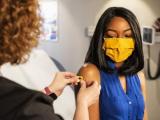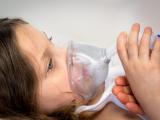Aug 27, 2009 (CIDRAP News) – Federal health officials today hosted a Web telecast to help pregnant women and new mothers prepare for an uptick in novel H1N1 flu infections, a day after a federal judge rejected an advocacy group's request to limit use of the H1N1 vaccine in pregnant women.
Pregnant women in the United States and other countries have had high rates of severe infections and deaths from the novel flu virus, which prompted a federal vaccine advisory group in July to recommend that pregnant women be placed high on the priority list to receive the vaccine. Experts say immune suppression during pregnancy puts women at greater risk for flu complications, and that respiratory compromise as women advance into the later trimesters may also play a role.
Judge turns back vaccine ban
The Coalition for Mercury-Free Drugs filed a motion for a preliminary injunction, heard yesterday in US District Court in Washington, DC, that would stop pregnant women from receiving flu vaccines preserved with thimerosal, a mercury compound, and prevent federal health officials from recommending that pregnant women receive the shots.
However, Judge Reggie Walton rejected the request, saying the group failed to show that shots containing thimerosal are harmful, Bloomberg News reported yesterday. He gave the group two more weeks to present more evidence before he grants a government motion to dismiss the suit.
Several advocacy groups have claimed that thimerosal, which contains ethyl mercury, is linked to autism and other birth defects. Thimerosal has been used in vaccines since the 1930s, but since 1999 it has been removed from most childhood vaccines. However, it is still used in injectable flu vaccines to guard against cross-contamination in multiuse vials, though some thimerosal-free flu vaccines are available in single-use vials and prefilled syringes.
During today's Webcast, Anthony Fauci, MD, director of the National Institute of Allergy and Infectious Diseases, said novel flu vaccine in single-use vials and preloaded syringes will not contain thimerosal and will be directed toward children and pregnant women. He said though scientific data do not show problems with thimerosal, the preservative has been eliminated from some vaccines because people are still concerned about it.
Officials make case for vaccination
Also during today's webcast, federal officials and women's health experts strongly urged pregnant women to get the seasonal vaccine now and to follow up with their first dose of the pandemic H1N1 vaccine as soon as it is available. Federal officials expect about 45 million doses in mid October.
Tina Johnson, CNM, director of professional practice and health policy at the American College of Nurse-Midwives, urged women to carefully weigh the risks and benefits of vaccination. "To have to deal with an illness during pregnancy could be very devastating," she said.
Laura Riley, MD, medical director for labor and delivery at Massachusetts General Hospital in Boston, said pregnant women are understandably concerned about taking any medical intervention that might affect their babies, but she said the seasonal flu vaccine has had a strong safety record in pregnant women over the past several years.
"There's no reason to suspect that this [the novel flu vaccine] is going to be different," she said, adding that maternal vaccination can help protect babies up to age 6 months, a group that can't be vaccinated. Riley is also a member of the National Vaccine Advisory Committee.
Fauci said the new vaccine is produced the same way by the same companies that have been making it for years. "Serious complications are so rare, you'll never be able to pick them up in clinical trials," he said.
Clinical trials of the novel flu vaccine to gauge efficacy and safety in pregnant women are expected to start in early September, Fauci said.
Viewers e-mailed several questions about vaccine safety to the webcast panel. In response to a question about vaccine interference with fetal brain development, Fauci said, "There's zero evidence that it happens."
Other pregnancy concerns
Many viewers had questions about what to do if they are sick with the new flu virus during childbirth or shortly after they deliver their babies. Riley said the situations are probably handled on a case-by-case basis. If a woman is sick with fever, is sneezing and coughing, and can't take care of the baby, the healthcare providers may want to isolate the baby. However, if the mother is being treated and seems fine, isolation may not be needed.
Fauci said, "It's a clinical judgment call."
Breastfeeding is usually safe, as long as the mother observes normal hand-washing procedures, the experts said. They also added that it's safe for women to continue breastfeeding while being treated with antiviral medications.
Riley urged pregnant women to call their healthcare providers when they have flu-like symptoms and if they know they've been exposed to the new virus. "Those are two instances when you really do need to pick up the phone," she said.
Viewers asked if going to school is safe for pregnant high school and college students. Anne Schuchat, MD, director of the Centers for Disease Control and Prevention's National Center for Immunization and Respiratory Diseases, said federal guidance for schools suggests that those focusing on vulnerable populations, such as pregnant women, consider dismissing students during severe outbreaks. However, she said recent guidance for colleges does not recommend that pregnant women stay out of the school setting.
Johnson advised pregnant women to ask any flu questions they have during routine prenatal visits. "Your provider is going to be a source. Bring your questions to your doctor," she said
See also:
Aug 25 Coalition for Mercury-free Drugs press release
May 12 CIDRAP News story "CDC urges vigilance for pregnant women with flu symptoms"
Jul 29 CIDRAP News story "Study on pandemic flu risks in pregnancy finds antiviral treatment delays"



















